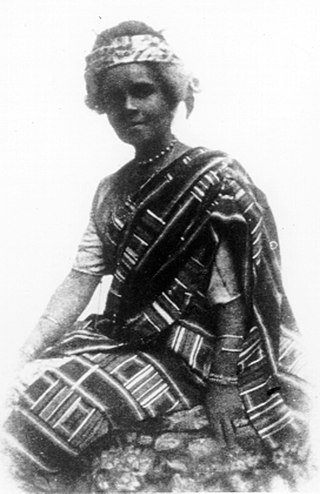Top Qs
Timeline
Chat
Perspective
Adelaide Casely-Hayford
Sierra Leonean educator (1868–1960) From Wikipedia, the free encyclopedia
Remove ads
Adelaide Casely-Hayford MBE (née Smith; 2 June 1868 – 24 January 1960),[1] was a Sierra Leone Creole advocate, activist of cultural nationalism, teacher, fiction writer, and feminist. Her commitment to public service led her to improving the conditions of black men and women. She played an important role as an advocate of women's education in Sierra Leone to popularize Pan-Africanist and feminist politics in the early 1900s.[2] In 1923, she founded a Girls' Vocational and Training School in Freetown to instil cultural and racial pride for Sierra Leoneans under colonial rule. In 1925, she attended a reception in honour of the Prince of Wales where she wore an African attire thereby creating a sensation in pursuit of Sierra Leone national identity and cultural heritage.[citation needed]
Remove ads
Early life and education
Adelaide Smith was born on 2 June 1868 in Freetown, British Sierra Leone. She attended Jersey Ladies' College (now Jersey College for Girls).[2] At Jersey Ladies' College, Casely Hayford and her sisters were the only black students, which taught her the power of kindness, as she wrote, "What did we know of racial prejudice, and an inferiority complex? Nothing! But we did know a lot about the milk of human kindness."[3] Like many other Sierra Leonean women born into the elite society, she was deeply influenced by Victorian values and ideas of family and gender roles.[2] Casely-Hayford also travelled, and while doing so became interested in Pan Africanist politics. At the age of 17, Smith went to Stuttgart, Germany, to study music at the Stuttgart Conservatory. She returned to England, where she and a sister opened a boarding home for African bachelors living in the country as students or workers.[4] During a speech in 1905, she emphasized the importance African women could have in social and political development.[2] Two years later, she returned to the Gold Coast (now Ghana).
Remove ads
Marriage and family
While in England, Adelaide Smith married J. E. Casely Hayford (also known as Ekra-Agiman). Their marriage may have given her a deeper insight into African culture and influenced her transformation into a cultural nationalist. Their daughter Gladys Casely-Hayford became a well-known Creole poet.[5] In 1914, Adelaide and J.E.'s marriage failed, after which she returned to Sierra Leone.[citation needed]
Remove ads
Legacy and honours
Casely-Hayford earned several awards from the colonial government in recognition of her contributions to the people of Sierra Leona.
- 1935: she was awarded the King's Silver Jubilee Medal.[6]: 50–51
- 1949: she received the MBE.[6]: 50–51
Asteroid 6848 Casely-Hayford, discovered by American astronomers Eleanor Helin and Schelte Bus at Palomar Observatory in 1978, was named in her memory.[7] The official naming citation was published by the Minor Planet Center on 27 August 2019 (M.P.C. 115893).[8]
References
Further reading
External links
Wikiwand - on
Seamless Wikipedia browsing. On steroids.
Remove ads

